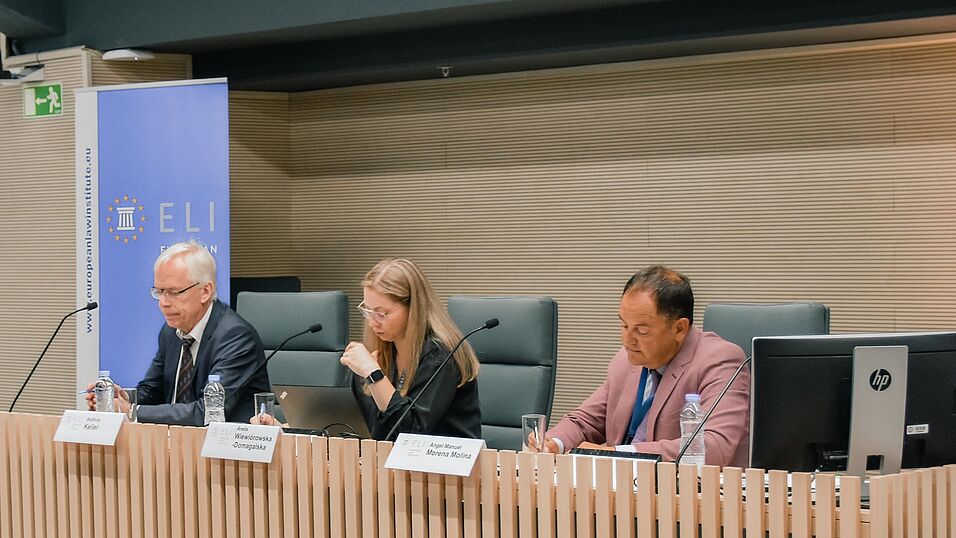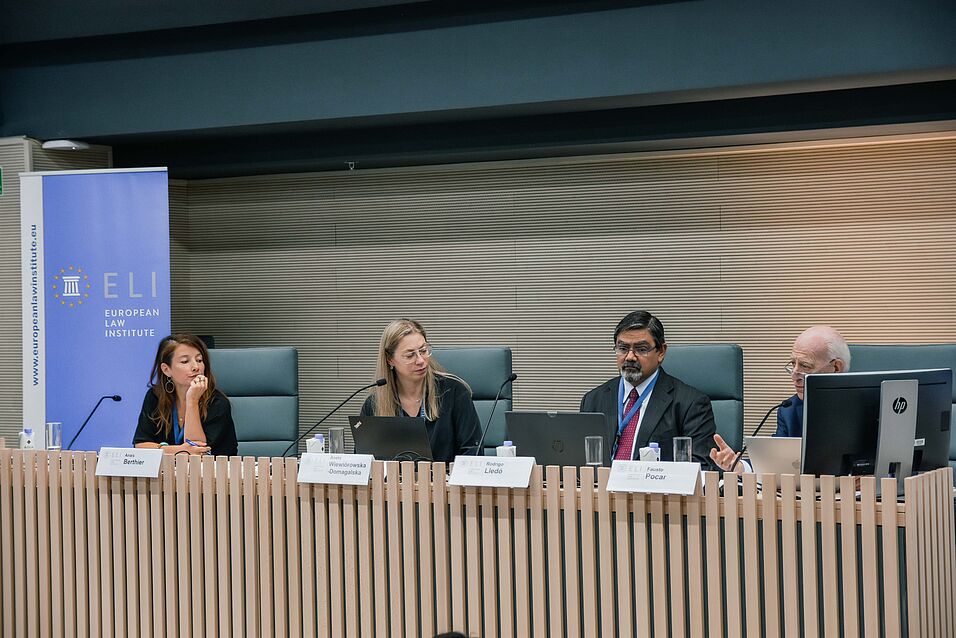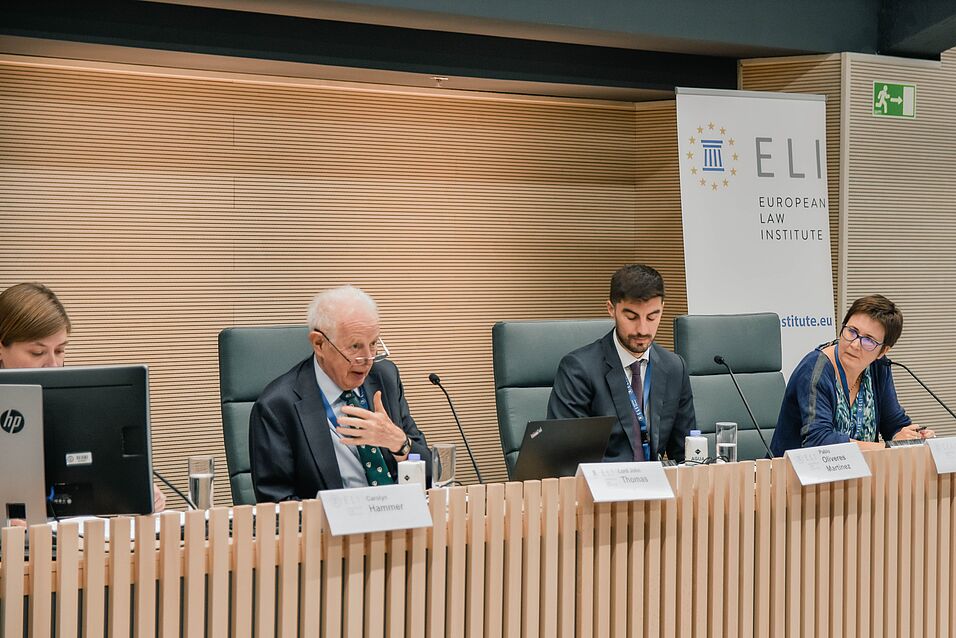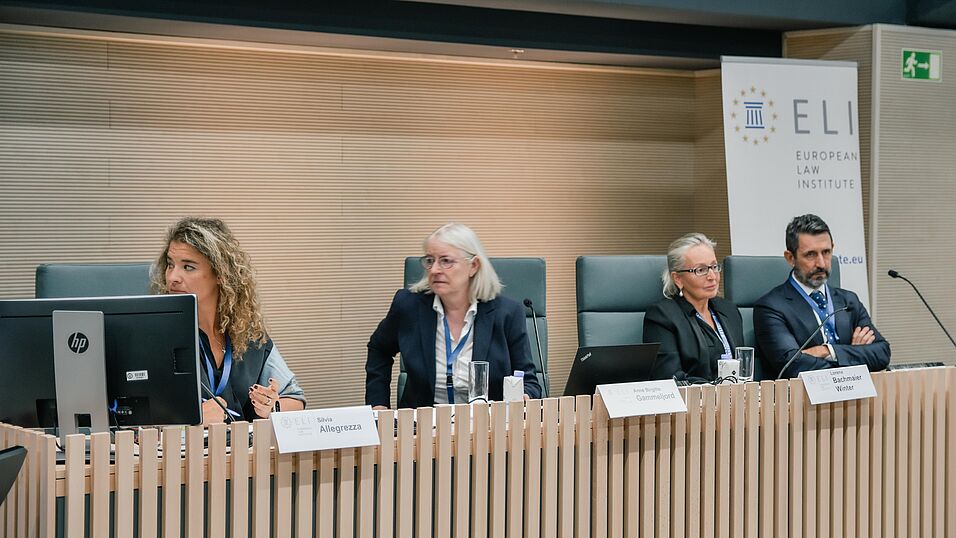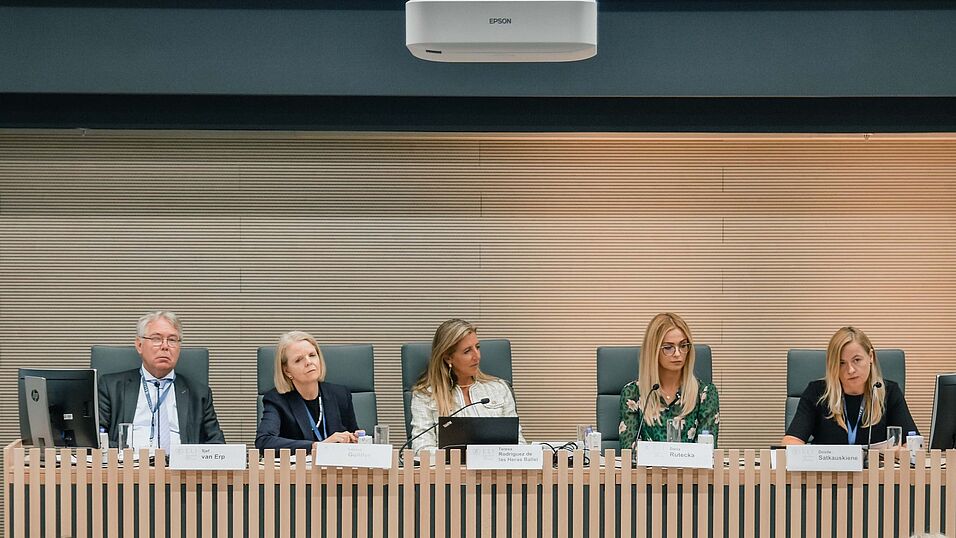During the first session on Climate Change – New Challenges for Law and Judges, Aneta Wiewiórowska (Chair; ELI Executive Committee Member; Senior Researcher, University of Osnabrück), Henrik Andersen (Project Co-Reporter; Associate Professor of International Economic Law, Copenhagen Business School), Matthias Keller (Presiding Judge, Administrative Court of Aachen), and Angel Manuel Moreno Molina (Law Professor, Carlos III University of Madrid) discussed the difficulties experienced in climate litigation, focusing on the liability of both corporations and States for unlawful actions and wrongful conduct. Henrik Andersen emphasised that the draft principles elaborated by the Project Team so far adopt an upper and lower limit of the law, leaving it to courts to choose whether they want to take a narrow or wide approach to the application of these cross-sectorial laws. Matthias Keller focused on the legally disruptive and uncertain character of climate change, emphasising the different perspectives involved in climate change litigation issues. He proposed to leave the fact-finding to judges, applying the existing legislature in a creative way to new environmental problems and thereby reinstating legal certainty. Angel Manuel Moreno Molina highlighted the limitations and shortcomings of litigation in this field, such as an overly broad concept of climate.
The next panel focused on the ELI project on Ecocide. Pocar Fausto (Project Co-Reporter; Ad Hoc Judge of the International Court of Justice; Professor Emeritus of International Law, Università degli Studi di Milano) introduced the project. He explained that it aims to support political and legal action which seeks to impose an EU-wide, trans-boundary crime to prevent damage to ecosystem(s). Anais Berthier (Senior Lawyer; Head of EU Affairs, ClientEarth) reflected on the effectiveness and the enforcement of criminal law, as well as the use of the Aarhus Convention in civil litigation, the need to reverse the burden of proof, and the multiplication of cases against corporations. Rodrigo Lledó (Director, Baltasar Garzón International Foundation; Professor, International University of La Rioja) explained the approach chosen in the definition of ‘ecocide’ drafted by the Independent Expert Panel for the Legal Definition of Ecocide of the Stop Ecocide Foundation. Lastly, Antonius Manders (Member, European Parliament; Rapporteur, Environmental Crime Proposal Directive) gave insight into the European Parliament’s perspective, and underlined the need for ‘parental liability’ in the case of actions against corporations. He also agreed on the need for an internationally accepted definition of ecocide.
The panel on ELI-Mount Scopus European Standards of Judicial Independence was chaired by Lord John Thomas (First ELI Vice-President; Lord Chief Justice of England and Wales from 2013–2017; President of the Qatar International Court; practicing arbitrator). Sophie Turenne (Project Co-Reporter; Senior Lecturer and Fellow in Law, University of Cambridge), Raffaele Sabato (Judge, European Court of Human Rights in respect of Italy), Carolyn Hammer (Rule of Law Adviser, Organisation for Security and Cooperation in Europe (OSCE) Office for Democratic Institutions and Human Rights (ODIHR)) and Pablo Olivares Martinez (Policy Officer, Justice Policy and Rule of Law Unit, European Commission) discussed the importance of striking a balance between broad universal rules and specific rules, in particular in the context of the selection criteria and the appointment and promotion processes of judges. Too much flexibility in these standards will harm their practical impact, therefore objective criteria for appointment are needed. ‘Merit’ should not be illusive and give way to self-serving judges. To understand ‘merit’, Turenne emphasised the need to monitor and engage with each particular jurisdiction. Panelists agreed that the area of judicial appointments is where these standards are crucial. A number of issues and remarks were mentioned in relation to the ELI-Mount Scopus Standards, including on the freedom of expression of judges, case allocation, and the accountability of judges.
The project on Admissibility of E-evidence in Criminal Proceedings in the EU was opened by Anne Birgitte Gammeljord (Chair; Second ELI Vice President; Lawyer, Danish Supreme Court; Assistant Lawyer, Maritime and Commercial Court). Lorena Bachmaier Winter (Project Co-Reporter; Full Professor, Complutense University of Madrid) presented the project’s draft legislative proposal and underlined that increasing cross-border criminality, as well as the risk of evidence laundering, called for the development of minimal standards regarding the admissibility of e-evidence in the EU. Pedro Pérez Enciso (Senior Prosecutor, International Cooperation Unit General, Prosecutor´s Office, Spain) focused on conflicts of jurisdiction and the difficulties encountered by prosecutors and defence lawyers in cross-borders cases. Tania Schröter (Deputy Head Unit, DG for Justice and Consumers, European Commission) discussed the need to enhance judicial cooperation, communication between authorities, as well as the need to balance clear and strong admissibility rules with the rights to a fair trial and those of the defense in general. Silvia Allegrezza (Associate Professor, University of Luxembourg) spoke about the missions of the European Public Prosecutor’s Office, and the difficulties currently encountered by different national legal systems in cross-border cases where a complete system of admissibility and evidence rules is still lacking. The debates during the Q&A focused on the assessment of proportionality and cyber privacy.
The final panel of the day focused on the ELI project on Access to Digital Assets: Enforcement and was opened by Chair, Teresa Rodríguez de las Heras Ballell (ELI Executive Committee Member; Project Team Member; Associate Professor, University Carlos III of Madrid; Sir Roy Goode Scholar, UNIDROIT (2021–2022)). Access to Digital Assets Project Co-Reporter Sjef van Erp (Emeritus Professor, Maastricht University) presented the project’s work, focusing on its proposed structure. This was followed by feedback from external speakers: Louise Gullifer (Rouse Ball Professor, University of Cambridge; Chair of the drafting committee of the UNIDROIT Working Group on the private law relating to digital assets) focused on the on-going work of UNIDROIT in the field, while Daria Rutecka (Senior Associate, Schoenherr) and Dovile Satkauskiene (Director, Chamber of Judicial Officers of Lithuania; General Secretary, European Union of Judicial Officers) provided valuable insights from legal practice. During the Q&A, the feasibility of uniform rules for digital assets, considering the different situations in which they can be accessed and sold on the market, were discussed among other things.

